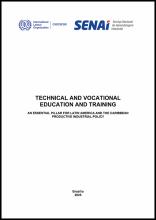Technical and Vocational Education and Training: an Essential Pillar for Latin America and the Caribbean Productive Industrial Policy

This document was made possible by a project-oriented partnership established with ILO/CINTERFOR and Brazil´s SENAI with the Instituto de Economia, Universidade Federal do Rio de Janeiro (IE/UFRJ). IE/UFRJ is UNIDO´s Latin American and Caribbean regional partner for the elaboration of its flagship, IDR 2024. With the support from ILO/CINTERFOR and SENAI their leaders and experts from both institutions shared their knowledge and mobilised knowledgeable representatives from 7 different institutions, across the region, to discuss the challenges imposed by digitalisation and green technologies to technical vocational training.
This document presents a stylized assessment of the stage of development of Latin American and Caribbean TVET. Concerning the demand side, the analysis will discuss the stage of development of the business sector and their needs for qualified workers to face up to the digital and green transitions, specifying the type of companies and/or sectors demanding professional training. Concerning the supply side, the analysis will discuss how local institutions have evolved to structure programs and actions specifically aimed to develop competencies (skills, abilities and knowledge) in digital and green technologies. A relevant topic of the analysis concerns how the participation of business sectors occurs in the anticipation of demands and in the operationalization of programs and actions, stressing the role the most successful local experiences and their degree of recognition by society. This analysis will support the assessment of current challenges faced by National TVET institutions in articulation with policy implications.
The analysis is organized in 6 sections besides this introduction. The first presents a short overview of the education and training levels in Latin America and the Caribbean. The second section considers the stage of adoption of digital and green technologies by the business sector in Latin America and the Caribbean. The third section discusses how the demand for qualified workers has evolved in the region, confronting the needs of the business sector to the prevailing labour competences, with a special focus on the demand for skills and competences in emerging new technologies. The fourth section discusses the role of TVET Institutions in Latin America and the Caribbean to attend the demands of the business sector, with a focus on two aspects: (i) the institutional and governance context, (ii) the funding mechanisms utilized by these institutions to perform their mandates. The following two sections analyse 7 TVET institutions cases of strategies, capabilities and the demand of the business sector in supporting digital (SENAI, Brazil, SENA, Colombia, Guatemala and SENATI, Peru) and green transition processes (INA, Costa Rica, Ministry of Labour, Chile and INFOTEP, Dominican Republic). The final section presents some reflections about the TVET challenges face and the related policy implications to strengthen the role of Vocational Training Institutes as an effective conduit of industrial transformation in the light of emerging new technologies.




